- Home
- Paul Fraser Collard
The Last Legionnaire
The Last Legionnaire Read online
Copyright © 2016 Paul Fraser Collard
The right of Paul Fraser Collard to be identified as the Author of the Work has been asserted by him in accordance with the Copyright, Designs and Patents Act 1988.
Apart from any use permitted under UK copyright law, this publication may only be reproduced, stored, or transmitted, in any form, or by any means, with prior permission in writing of the publishers or, in the case of reprographic production, in accordance with the terms of licences issued by the Copyright Licensing Agency.
First published as an Ebook by Headline Publishing Group in 2016
All characters – other than the obvious historical figures – in this publication are fictitious and any resemblance to real persons, living or dead, is purely coincidental.
Cataloguing in Publication Data is available from the British Library
Ebook conversino by Avon DataSet Ltd, Bidford-on-Avon, Warwickshire
eISBN: 978 1 4722 2274 9
HEADLINE PUBLISHING GROUP
An Hachette UK Company
Carmelite House
50 Victoria Embankment
London EC4Y 0DZ
www.headline.co.uk
www.hachette.co.uk
Contents
Title Page
Copyright Page
About Paul Fraser Collard
About the Book
By Paul Fraser Collard
Dedication
Praise
Acknowledgments
Glossary
Map – North-West Italy (1859)
Chapter One
Chapter Two
Chapter Three
Chapter Four
Chapter Five
Chapter Six
Chapter Seven
Chapter Eight
Chapter Nine
Chapter Ten
Chapter Eleven
Chapter Twelve
Chapter Thirteen
Chapter Fourteen
Chapter Fifteen
Chapter Sixteen
Chapter Seventeen
Chapter Eighteen
Chapter Nineteen
Chapter Twenty
Chapter Twenty-one
Chapter Twenty-two
Chapter Twenty-three
Chapter Twenty-four
Chapter Twenty-five
Chapter Twenty-six
Chapter Twenty-seven
Chapter Twenty-eight
Chapter Twenty-nine
Chapter Thirty
Chapter Thirty-one
Chapter Thirty-two
Chapter Thirty-three
Chapter Thirty-four
Chapter Thirty-five
Chapter Thirty-six
Chapter Thirty-seven
Chapter Thirty-eight
Chapter Thirty-nine
Chapter Forty
Chapter Forty-one
Chapter Forty-two
Chapter Forty-three
Chapter Forty-four
Chapter Forty-five
Chapter Forty-six
Chapter Forty-seven
Epilogue
Historical Note
Paul’s love of military history started at an early age. A childhood spent watching films like Waterloo and Zulu whilst reading Sharpe, Flashman and the occasional Commando comic gave him a desire to know more of the men who fought in the great wars of the nineteenth and twentieth centuries. At school, Paul was determined to become an officer in the British Army and he succeeded in winning an Army Scholarship. However, Paul chose to give up his boyhood ambition and instead went into the finance industry. Paul still works in the City, and lives with his wife and three children in Kent.
Jack Lark has come a long way since his days as a gin palace pot boy. But can he surrender the thrill of freedom to return home?
London, 1859. After years fighting for Queen and country, Jack walks back into his mother’s East End gin palace a changed man. Haunted by the horrors of battle, and the constant fight for survival, he longs for a life to call his own. But the city – and its people – has altered almost beyond recognition, and Jack cannot see a place for himself there.
A desperate moment leaves hi indebted to the Devil – intelligence officer Major John Ballard, who once again leads Jack to the battlefield with a task he can’t refuse. He tried to deny being a soldier once. He won’t make the same mistake again.
Europe is about to go to war. Jack Lark will march with them.
By Paul Fraser Collard
The Scarlet Thief
The Maharajah’s General
The Devil’s Assassin
The Lone Warrior
Digital Short Stories
Jack Lark: Rogue
Jack Lark: Recruit
Jack Lark: Redcoat
For the Butterworths
‘Collard . . . evokes the horror of that era with great brio. Enthralling’ The Times
‘Brilliant’ Bernard Cornwell
‘I love a writer who wears his history lightly enough for the story he’s telling to blaze across the pages like this. Jack Lark is an unforgettable new hero’ Anthony Riches
‘Races along with the speed of a bullet fired from an Enfield rifle’ Historical Novel
‘This is the first book in years I have enjoyed that much that I had to go back and read it again immediately’ Parmenion Books
‘Collard is to be congratulated for producing a confident, rich and exciting novel that gave me all the ingredients I would want for a historical adventure of the highest order’ For Winter Nights
‘This is a fresh take on what could become a hackneyed subject, but in Fraser Collard’s hands is anything but’ Good Book Guide
‘This is what good historical fiction should do – take the dry dusty facts from history books and tell the story of the men and women who lived through them – and Collard does this admirably’ Our Books Reviews
I hope it should not come as a great surprise if I confess that I thoroughly enjoy writing the Jack Lark series. Luckily for you the reader, I am not left totally to my own devices, and I would like to take this opportunity to thank those who help and guide me through the writing of these novels.
My agent, David Headley, deserves a huge thank you. I am very aware of how fortunate I am to be a published writer and to have the joy of seeing my stories made into such fabulous books. Without David’s hard work and professionalism I would not be having the fun I am and for that I shall always owe him a great deal.
My editor, Frankie Edwards, has worked tirelessly on my behalf and I would like to thank her here for everything she has done. This novel would not be as good as it is without Frankie’s professional and insightful advice, and I would like to thank her for her terrific support.
Jane Selley, my copyeditor on all of the Jack Lark novels, also deserves a great deal of thanks. One day I shall learn how to use a comma properly (amongst many other things), but until then I hope Jane will continue to have the patience to correct all of my many and varied mistakes.
I must also thank a group of people I have never met. The team at Headline who design my covers deserve all the credit for creating the fantastic images that adorn my novels. I think they are simply stunning and I am very proud indeed to have such wonderful covers for my books.
Lastly I would like to publicly thank my family for supporting me through thick and thin. Thank you guys.
arrack native liquor/spirit
Buffs nickname for the 3rd (East Kent) Regiment of Foot
bundook slang for a rifle or musket
chechia brimless cap with a tassel, similar to a fez
chokey cholera
costermonger man who sells produce such as fish, fruit or vegetables from a barrow or basket
/>
en échiquier French military tactic where infantry units advance as if each was on a separate square of a chessboard
furlough period of leave from the army
hawa khana to take the air (Urdu)
kepi military cap with a flat circular top and visor
macadam road surface made of tiny granite stones
munshi language teacher
pandy colloquial name for sepoy mutineers, derived from the name of Mangal Pandey of the 34th Bengal Native Infantry
particular London fog
patterer street vendor who sells their wares with speeches that have little regard for either truth or propriety
poker knife or sword
rhino money, cash
rookery city slum
Rupert slang for a British officer
sapeur de génie French soldier of engineers
shako military cap in the shape of a cone, with a peak, worn with a short coloured plume
tin money, cash
Uhlans Austrian light cavalry armed with lances
walk the chalk withdraw, go away
Zouaves French infantry unit famous for colourful uniform
London, March 1859
The alleyway stank to high heaven. The remains of a dead dog lay beside the officer’s boots, its rotten corpse bloated and stinking. The stench rose up, the fetid miasma catching at the back of his throat, so he spat, scouring the bitterness from his mouth. The stink of the rookeries had not changed in the years he had been away.
He pulled his greatcoat a little tighter around him, then stepped over the matted fur of the dead dog. The streets far from London’s more fashionable areas were familiar to him, despite the fact that he had not been there for nigh on a decade. The mean back-to-back houses of the slums were still pressed cheek by jowl. The same angry shouts of frustration came from the souls incarcerated within, the screams of their babies stirring memories of the place he had left so many years before.
He had long thought about this moment, the dream of his return sustaining him during his first weeks and months in the Queen’s army. He had been forced to leave this place, a brutal fight denying him the right to live under his mother’s roof. The army had taken him in. It had clothed him and fed him. It had trained him to be a redcoat, a killer of the Queen’s many enemies, and it had given him a home when no one else would. Now he was back wearing the uniform of a captain in the 3rd Regiment of Foot. He was no longer the unwanted son, the boy who just wanted to be man. He was an officer, a man of station and importance. Or at least he was dressed as one.
The officer pressed on. He stuck to the alleyways; the narrow spaces that ran behind the tight rows of squalid housing. The main streets would be busy this close to dinnertime. The match sellers and the patterers would be working the crowd, and the costermongers would be looking to clear away the last of the day’s stock from their barrows before they turned in for the night. The officer did not want the attention that he knew his presence would attract. The eager men, women and children who worked the streets of Whitechapel were certain to be keen to see him part with the shillings in his pockets, either willingly or not.
A young boy came rushing in the opposite direction. He was moving fast, his small feet sure and steady, his arms pumping hard as he ran. He only spotted the tall figure in the greatcoat at the last moment, and he skidded to a halt, his eyes darting this way and that as he tried to find a way past.
‘’Scuse me, mister.’
The officer smiled. He had spotted the boy’s clenched fist, and could smell the aroma of the small meat pie even over the pungent stink of the alley. He fished in a pocket to pull out a coin before offering it up like a conjuror seeking to amaze his audience.
‘You want to earn a sixpence, lad?’
The boy’s face creased into a scowl. He could not have been more than ten years old, but he knew enough to be wary of gentlemen who hid in the shadows and flashed their money at small boys.
The officer saw the boy’s expression. He wanted to laugh, but he kept his humour contained, just as he hid all his emotions away. ‘Stand easy, lad. I’ve got a question, that’s all.’
The look of suspicion did not change.
‘The Counting House, do you know it?’
The boy bit his lip. His eyes were fixed on the sixpence.
The officer lifted the coin higher, further from the boy’s reach. ‘Do you know it?’ he repeated.
The boy nodded, his scowl deepening as he realised he could not snatch the coin and escape.
‘Who runs the place these days?’
‘Old Maggie, of course.’ The boy’s answer was quick, his scorn at such a foolish question obvious.
‘Maggie Lampkin?’ The officer lowered the coin a fraction.
‘Course. It has always been her place.’
‘What about her old man? Is he still there?’
‘You said one question.’ The boy’s eyes narrowed. ‘Two questions cost a shilling.’
The officer could not help but smile. ‘For a shilling, I’d want you to take me there.’
The boy flashed a smile of his own. He had never spent a single day at school, but he knew how to tally a man’s worth. ‘You lost, mister?’
‘No.’
‘Then why’d you want me to walk you?’
‘Maybe I just want the company.’ The officer watched the boy closely. It did not feel so long ago that it had been him filching meat pies from old Bartholomew’s barrow.
‘I ain’t that kind of boy, mister.’
The officer’s hand moved quicker than the boy’s eyes could track. It cuffed him around the ear, the blow short and sharp. ‘Shut your filthy muzzle.’
The boy lifted his chin to show the blow had not hurt. ‘So what’s your name, mister?’
The officer snorted. ‘The going rate appears to be sixpence for a question, a shilling for two.’
The boy laughed. The sound came quick and easy. ‘Fair enough.’ This time it was his hand that moved fast, the purloined pie slipped into a pocket. ‘I’ll take you to the ginny.’ He looked the officer in the eye. ‘For that shilling of yours.’
The officer flicked the sixpence at his new guide. ‘I don’t want any trouble. You get me there nice and quiet and I might be inclined to be generous.’
The boy snatched the coin out of the air, making it disappear within the span of a single heartbeat. He contemplated the officer, his eyes narrowing as he assessed the options.
The officer saw it all. He raised a hand and pointed down the alley. ‘Now walk your chalk. I’ll follow you. And if you run, I’ll come after you.’
‘I won’t peg it, mister.’ The boy’s fleeting smile hid the notion that he had been thinking of doing exactly that. ‘I want your other sixpence.’
The officer did not respond to the choice reply. He waited for the boy to do as he had been instructed.
The boy took one last look at the scarred face and the hard grey eyes. The officer did not appear to be the sort to take kindly to being disobeyed, so he turned and set off down the alleyway.
The officer followed. He did not need the boy to show him the way, but he had not lied when he had said he wanted the company. He knew the paths he had to follow, but not who waited around the next corner. The boy would. The officer did not fear footpads; he had killed too many men for that. But he did not want to return here as a killer. There would be time enough to reveal his bitter talents, the skills that had kept him alive on the battlefields of the Crimea, Persia and India. For now, he wanted nothing more than to find out if he had a place that he could finally call home.
The officer held back as they emerged from the alley. The light was fading, but the three pairs of gas lamps on the wall of the gin palace burned brightly enough to cast a glow for yards in all directions. The blue-tinged light played across the display of gilded rosettes and sconces on the palace’s garish facade, the gilt burners a beacon that summoned the thirsty congregation to their worship.
Yet that pride had not been his to savour. It had faded fast, quicker even than the purple and yellow bruises that marked his flesh as his mother’s old man demonstrated just who owned what. He had not felt the same pride again until the day he had first pulled the heavy woollen red coat of a soldier on to his shoulders.
‘Come on, mister. What you waiting for?’ The boy turned to shake his head at the rum cove with the ready supply of tin. ‘There it is. I saw you right, didn’t I just.’ The palm was held out. ‘I reckon that’s sixpence you owe me.’
The officer dipped a hand into the pocket of his greatcoat, then flipped out another coin. ‘Easy money.’
This coin too disappeared quickly. ‘You want me to wait to get you back to a cab?’
The officer smiled. ‘No.’
‘Staying for a bit, are you?’ The boy smirked. He knew why men of a respectable kind would go out of their way to visit a back-street gin palace.
‘Perhaps.’ The officer knew what raised the boy’s smile. ‘Does Mary still work there?’
The smile was gone. The scowl that replaced it was fierce. ‘She works there, but not like that. And she’s too good for the likes of you.’
The officer was surprised by the strength of the reaction. He had once believed he had loved this girl called Mary. She had been a rare beauty, the kind that men would pay dearly for the right to be in her bed for an hour or two. The officer had never been granted such a delight, but the notion still sparked an itch in his groin that even nine years away had been unable to extinguish.
He looked at the boy carefully. ‘What does she do now?’
The chin lifted. ‘She helps Maggie run the place. Looks after it herself at times too.’

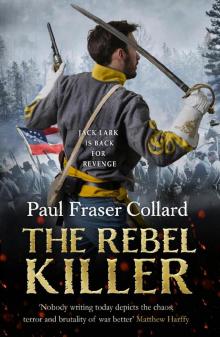 THE REBEL KILLER
THE REBEL KILLER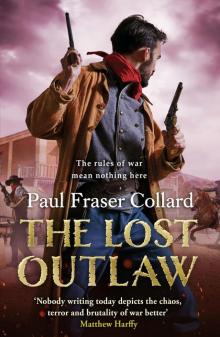 The Lost Outlaw
The Lost Outlaw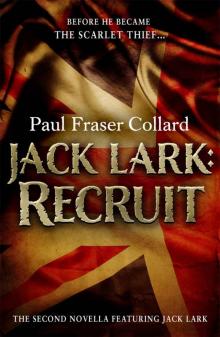 Jack Lark: Recruit (A Jack Lark Short Story)
Jack Lark: Recruit (A Jack Lark Short Story)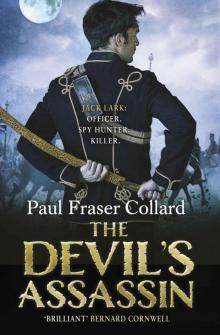 The Devil's Assassin (Jack Lark)
The Devil's Assassin (Jack Lark)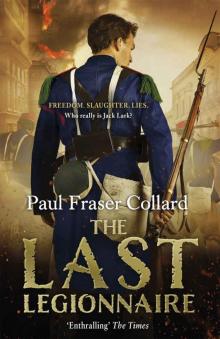 The Last Legionnaire
The Last Legionnaire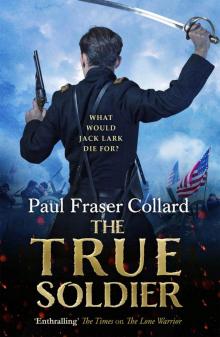 The True Soldier: Jack Lark 6
The True Soldier: Jack Lark 6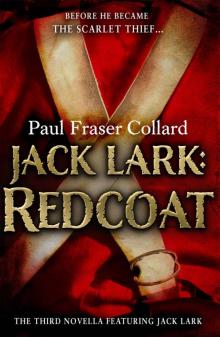 Jack Lark: Redcoat (A Jack Lark Short Story)
Jack Lark: Redcoat (A Jack Lark Short Story)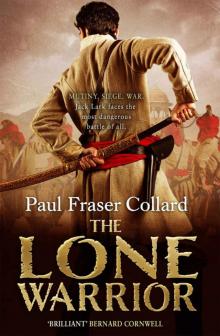 The Lone Warrior
The Lone Warrior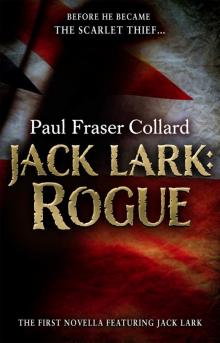 Jack Lark: Rogue
Jack Lark: Rogue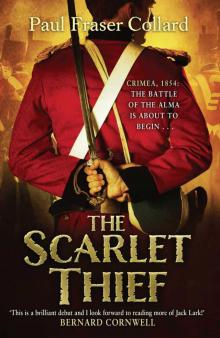 The Scarlet Thief
The Scarlet Thief